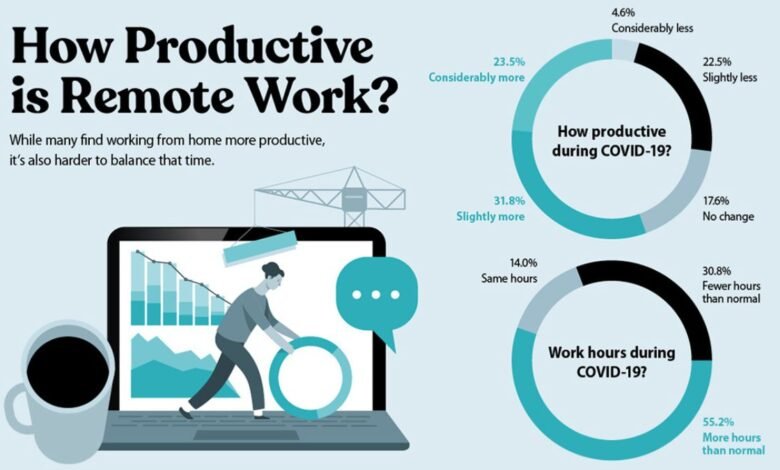The Future of Remote Work: Trends and Predictions

In recent years, remote work has transformed from a niche practice into a global phenomenon, accelerated further by the COVID-19 pandemic. This article explores the evolving landscape of remote work, delving into current trends and offering insights into what the future may hold for this increasingly prevalent way of working.
Introduction
Remote work, once considered a perk for a select few, has now become a mainstream approach to work across industries worldwide. The onset of the COVID-19 pandemic acted as a catalyst, forcing organizations to adapt quickly to remote work setups to ensure business continuity. As the world emerges from the pandemic, remote work continues to shape the future of work environments, employee expectations, and organizational strategies.
The Rise of Remote Work
The concept of remote work is not entirely new but has gained significant traction in recent years. Advances in technology, particularly in communication and collaboration tools, have made it feasible for employees to work effectively from anywhere. Companies have increasingly embraced remote work as a means to attract talent, reduce overhead costs, and promote work-life balance among employees.
Benefits of Remote Work
Remote work offers numerous benefits to both employers and employees. For employers, it can lead to increased productivity, lower office space costs, and access to a wider talent pool. Employees often enjoy greater flexibility, reduced commuting stress, and improved work-life integration. Moreover, remote work has been shown to enhance employee satisfaction and retention rates.
Challenges and Solutions
Despite its advantages, remote work also presents challenges. Issues such as maintaining team cohesion, ensuring cybersecurity, and monitoring employee performance can arise. However, organizations are addressing these challenges through effective communication strategies, robust cybersecurity measures, and performance-based assessments rather than time-based metrics.
Remote Work Technologies
Technological advancements have played a pivotal role in enabling remote work. Cloud computing, video conferencing tools, project management software, and collaboration platforms have revolutionized how teams communicate and collaborate remotely. The future of remote work will likely see continued innovation in these technologies, making remote work more seamless and efficient.
Impact on Work Culture
The shift to remote work has prompted a reevaluation of traditional work cultures. Organizations are fostering inclusive remote cultures by promoting transparency, trust, and effective communication. Virtual team-building activities, online social events, and digital wellness initiatives are becoming commonplace to maintain employee morale and a sense of belonging.
Remote Work and Real Estate
The prevalence of remote work has implications for commercial real estate markets. Many companies are downsizing their physical office spaces or adopting flexible office arrangements to accommodate hybrid work models. This trend is reshaping urban landscapes and influencing commercial property investment strategies globally.
Legal and Regulatory Considerations
As remote work becomes more prevalent, legal and regulatory frameworks are evolving to address new challenges. Issues related to taxation, data privacy, employment contracts, and health and safety regulations in home offices are gaining prominence. Governments and organizations are working together to establish clear guidelines and policies to support remote workers.
Future Trends in Remote Work
Looking ahead, several trends are expected to shape the future of remote work:
- Hybrid Work Models: Many organizations are embracing hybrid work models that combine remote and on-site workdays to provide flexibility while maintaining collaboration.
- Global Talent Pools: Remote work enables companies to tap into a global talent pool, leading to more diverse and inclusive workplaces.
- Emphasis on Well-being: Employers are increasingly focusing on employee well-being by offering remote work perks, mental health resources, and flexible work schedules.
- Technological Integration: Continued advancements in artificial intelligence, virtual reality, and augmented reality will further enhance remote work capabilities.
- Sustainability Initiatives: Reduced commuting and office space usage contribute to environmental sustainability, making remote work an attractive option for eco-conscious organizations.
Predictions for Remote Work
Based on current trends and technological advancements, remote work is likely to become even more integrated into the fabric of modern work culture. By 2030, it is projected that a significant portion of the global workforce will have remote work capabilities, with a growing emphasis on digital skills and remote team dynamics. The evolution of remote work will continue to influence corporate strategies, urban development patterns, and individual career choices worldwide.
Conclusion
The future of remote work appears promising, driven by technological innovation, changing work preferences, and global connectivity. As organizations adapt to these shifts, embracing remote work as a viable alternative to traditional office setups, the landscape of work will continue to evolve. By staying abreast of emerging trends and preparing for future developments, businesses and employees alike can harness the full potential of remote work in the years to come.
In summary, the future of remote work is not just about where people work but how they work, collaborate, and thrive in a digitally interconnected world. As remote work continues to evolve, its impact on productivity, culture, and society will be profound, shaping a new era of work that is flexible, inclusive, and resilient.



